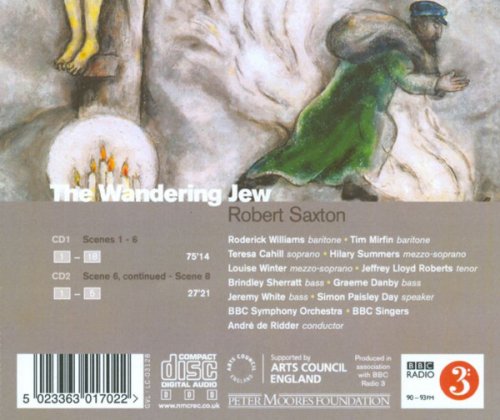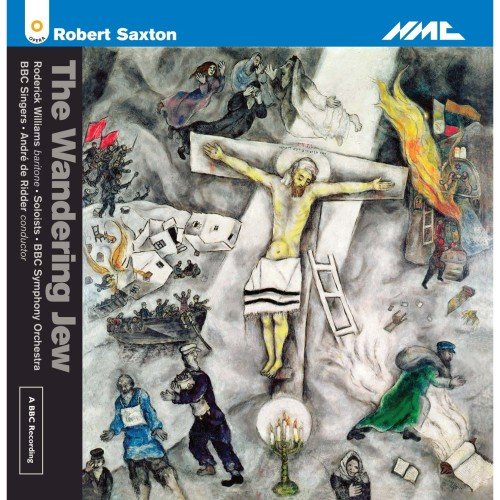
Roderick Williams, Tim Mirfin, BBC Symphony Orchestra and André de Ridder - Saxton: The Wandering Jew (2012)
BAND/ARTIST: Roderick Williams, Tim Mirfin, BBC Symphony Orchestra, André de Ridder
- Title: Saxton: The Wandering Jew
- Year Of Release: 2012
- Label: NMC Recordings
- Genre: Classical, Opera
- Quality: FLAC (tracks)
- Total Time: 01:42:21
- Total Size: 435 MB
- WebSite: Album Preview
Tracklist:
CD 1 - 01:15:13
Scene 1 -
01. Pt. 1, After Nearly Two Thousand Years of Wandering, Here - [04:22]
02. Pt. 2, Sixty Thousand Soldiers - [05:01]
03. Interlude - [01:55]
Scene 2 -
04. Wind-blown, the Night Sand Is Cold - [05:02]
05. Interlude - [00:37]
Scene 3 -
06. Pt. 1, Centuries of Wandering Made Me Lose All Sense of Passing Time - [06:43]
07. Pt. 2, Mama, May We Hear a Tale? - [04:57]
08. Pt. 3, They're Asleep - [07:10]
09. Interlude - [00:29]
Scene 4 -
10. I Know What This Waiter Will Say - [07:10]
11. Interlude - [02:37]
Scene 5 -
12. Pt. 1, What Is This Place, So Wild, So Cold? - [07:35]
13. Pt. 2, This Mortal God - [05:42]
14. Interlude - [02:52]
Scene 6 -
15. Pt. 1, By Canals, in Streets Overflowing with Life - [01:43]
16. Pt. 2, Venice's Carnival... The Human Need for Song, Dance, Food, Drink, Companionship - [02:52]
17. Pt. 3, I've Seen Centuries of Dancers - [05:30]
18. Pt. 4, For Some Time I Wandered Amongst the Crowds of Swirling - [02:56]
CD 2 - 00:27:20
01. Pt. 5, Roll Up, Roll Up - [06:39]
02. Interlude - [01:11]
Scene 7 -
03. Having Had a Narrow Escape - [14:32]
04. Interlude - [01:36]
Scene 8 -
05. Daybreak, the Sand Grows Warm - [03:22]

CD 1 - 01:15:13
Scene 1 -
01. Pt. 1, After Nearly Two Thousand Years of Wandering, Here - [04:22]
02. Pt. 2, Sixty Thousand Soldiers - [05:01]
03. Interlude - [01:55]
Scene 2 -
04. Wind-blown, the Night Sand Is Cold - [05:02]
05. Interlude - [00:37]
Scene 3 -
06. Pt. 1, Centuries of Wandering Made Me Lose All Sense of Passing Time - [06:43]
07. Pt. 2, Mama, May We Hear a Tale? - [04:57]
08. Pt. 3, They're Asleep - [07:10]
09. Interlude - [00:29]
Scene 4 -
10. I Know What This Waiter Will Say - [07:10]
11. Interlude - [02:37]
Scene 5 -
12. Pt. 1, What Is This Place, So Wild, So Cold? - [07:35]
13. Pt. 2, This Mortal God - [05:42]
14. Interlude - [02:52]
Scene 6 -
15. Pt. 1, By Canals, in Streets Overflowing with Life - [01:43]
16. Pt. 2, Venice's Carnival... The Human Need for Song, Dance, Food, Drink, Companionship - [02:52]
17. Pt. 3, I've Seen Centuries of Dancers - [05:30]
18. Pt. 4, For Some Time I Wandered Amongst the Crowds of Swirling - [02:56]
CD 2 - 00:27:20
01. Pt. 5, Roll Up, Roll Up - [06:39]
02. Interlude - [01:11]
Scene 7 -
03. Having Had a Narrow Escape - [14:32]
04. Interlude - [01:36]
Scene 8 -
05. Daybreak, the Sand Grows Warm - [03:22]
Robert Saxton's long—awaited radio opera, commissioned by the BBC, is a modernist interpretation of the story of the Eternal Jew, a Shoemaker who was condemned by Jesus to wander the Earth until the Second Coming after he refused to help him on his way to crucifixion.
The opera features many legendary characters based on medieval and other myths, including Faust, Mephistopheles, Kundry and Wotan.
Beneath its surface lies a structure related to the annual cycle of Jewish and Christian holidays, presented in eight scenes of large-scale orchestral and choral music enhanced by studio post-processing by Anthony Pitts.
This undoubtedly significant and groundbreaking work seems to be a curious hybrid: part oratorio, part opera, with the inclusion of electronics and with oral narration superimposed on top.
The action moves in space and time,
starting in a Nazi death camp, returning to Jerusalem during the Roman occupation, then traveling to Cordoba in the 11th century and the Venetian Carnival in the 18th century, and including encounters with Faust, Mephistopheles, Odin and Kundry along the way.
The opera features many legendary characters based on medieval and other myths, including Faust, Mephistopheles, Kundry and Wotan.
Beneath its surface lies a structure related to the annual cycle of Jewish and Christian holidays, presented in eight scenes of large-scale orchestral and choral music enhanced by studio post-processing by Anthony Pitts.
This undoubtedly significant and groundbreaking work seems to be a curious hybrid: part oratorio, part opera, with the inclusion of electronics and with oral narration superimposed on top.
The action moves in space and time,
starting in a Nazi death camp, returning to Jerusalem during the Roman occupation, then traveling to Cordoba in the 11th century and the Venetian Carnival in the 18th century, and including encounters with Faust, Mephistopheles, Odin and Kundry along the way.

As a ISRA.CLOUD's PREMIUM member you will have the following benefits:
- Unlimited high speed downloads
- Download directly without waiting time
- Unlimited parallel downloads
- Support for download accelerators
- No advertising
- Resume broken downloads


